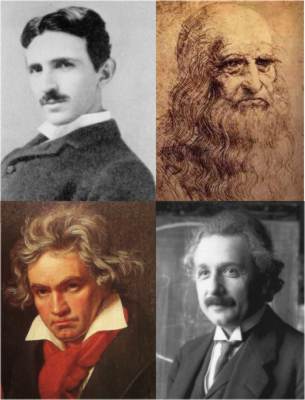Home • Creativity


Tesla, da Vinci, Beethoven and Einstein
Exceptional intellectual or creative ability, or any person who has such ability
This manifests itself as the person's ability to think of great ideas that are truly original. As a result, many people believe that the best way to recognize genius is by looking at the work that is produced. In short, genius is as genius does. On the other hand, there are also many who believe that most geniuses do not get a chance to display their potential and that IQ testing would be better for recognizing them. However, there are some serious drawbacks with the latter school of thought including the following:
1. Standardized IQ tests are timed. The truth is that being able to answer questions quickly is not necessarily a good indication of the person's ability to generate original works of high quality. In fact, many of the great geniuses took a very long time to produce their great works.
2. IQ tests often contain questions about trivia. Obviously, knowledge of trivia has little or nothing to do with the ability to conceive anything new. Let's face it, having read the works of Jules Verne does not mean that the person is ready to produce works of equal quality and originality.
3. If you think of an answer that was not thought of by the person who made the answer key, your answer will be graded as wrong. This can make these tests unreliable because a genius is defined by his or her ability to think of solutions that no one else thought of.
We know that there are many types of intelligences, and that IQ tests measure only some of them. Unfortunately, it seems that IQ tests primarily measure your ability to do well on IQ tests and not necessarily much else. For example, Richard Feynman did not score high enough on an IQ test to qualify for MENSA although he developed the theory of Quantum Electrodynamics (explaining the behavior of light). Also, he taught himself calculus when he was 13 years old, which is a feat that is beyond the capabilities of many people who can qualify for MENSA.
When we consider Richard Feynman and other people like Einstein, Beethoven, Rembrandt, or Leonardo da Vinci, it is clear that their genius showed in their work and not as a test score. Consequently, when we mention genius, our definition will be based on the work produced and not on test scores.


Tesla, da Vinci, Beethoven and Einstein
Defining Genius
If you check different sources, you will probably get different verbage as to the definition of genius. However, they generally say the following:Exceptional intellectual or creative ability, or any person who has such ability
This manifests itself as the person's ability to think of great ideas that are truly original. As a result, many people believe that the best way to recognize genius is by looking at the work that is produced. In short, genius is as genius does. On the other hand, there are also many who believe that most geniuses do not get a chance to display their potential and that IQ testing would be better for recognizing them. However, there are some serious drawbacks with the latter school of thought including the following:
1. Standardized IQ tests are timed. The truth is that being able to answer questions quickly is not necessarily a good indication of the person's ability to generate original works of high quality. In fact, many of the great geniuses took a very long time to produce their great works.
2. IQ tests often contain questions about trivia. Obviously, knowledge of trivia has little or nothing to do with the ability to conceive anything new. Let's face it, having read the works of Jules Verne does not mean that the person is ready to produce works of equal quality and originality.
3. If you think of an answer that was not thought of by the person who made the answer key, your answer will be graded as wrong. This can make these tests unreliable because a genius is defined by his or her ability to think of solutions that no one else thought of.
We know that there are many types of intelligences, and that IQ tests measure only some of them. Unfortunately, it seems that IQ tests primarily measure your ability to do well on IQ tests and not necessarily much else. For example, Richard Feynman did not score high enough on an IQ test to qualify for MENSA although he developed the theory of Quantum Electrodynamics (explaining the behavior of light). Also, he taught himself calculus when he was 13 years old, which is a feat that is beyond the capabilities of many people who can qualify for MENSA.
When we consider Richard Feynman and other people like Einstein, Beethoven, Rembrandt, or Leonardo da Vinci, it is clear that their genius showed in their work and not as a test score. Consequently, when we mention genius, our definition will be based on the work produced and not on test scores.

